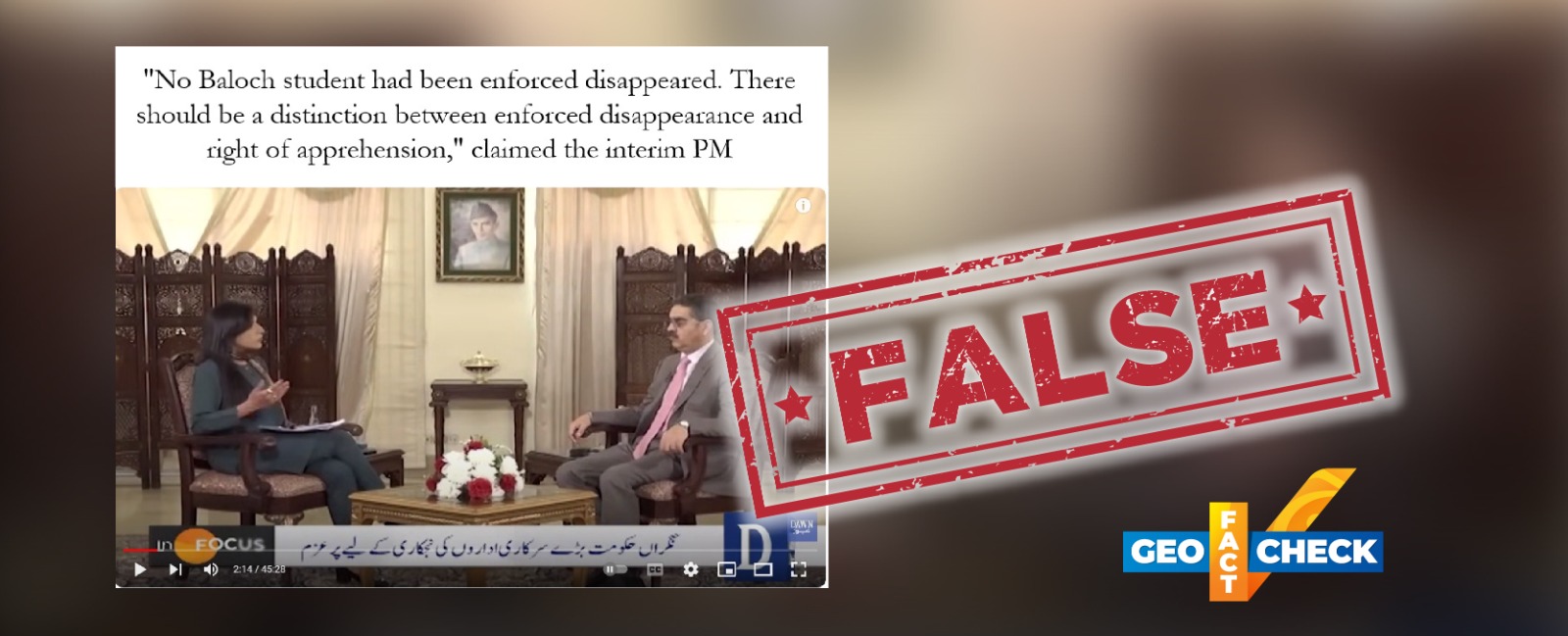Fact-check: Interim PM makes another false claim about enforced disappearances
Official documents, lawyers and human rights activists dispute prime minister’s claim that no case of enforced disappearance of students from Balochistan has been recorded to date

The interim prime minister has claimed in a recent television interview that no student from the Balochistan province has been a victim of enforced disappearance to date.
The claim is baseless.
Claim
In an interview to Dawn News on November 3, interim Prime Minister Anwaar-ul-Haq Kakar was asked about cases of enforced disappearances in the country, where a person is arrested, detained or abducted by agents of the state and the whereabouts of the disappeared person are later concealed by the state.
In his reply to the question, Kakar claimed that there was a difference between the “right of apprehension” and “enforced disappearances”, adding that the right of apprehension, which according to him was the act of law enforcement agencies arresting a person facing an accusation, was the “inherent right of any state”.
Kakar then stated that if, for example, an arrested person is held for 10 or 12 days and not presented in a court because the law enforcement agencies “are still documenting the apprehension”, the case would not classify as an enforced disappearance.
When the host pressed the premier about the enforced disappearances of students from Balochistan, Kakar alleged that “no Baloch student” had been enforced disappeared, again emphasising the host differentiating between “enforced disappearance” and “right of apprehension”.
“In many cases, these young men [the Baloch students], if they have been arrested due to any allegation, and if they have [later] appeared [in front of a magistrate] then we cannot put them in the category of enforced disappearance,” he added.
Fact
Official documents, lawyers and human rights activists contradict the prime minister’s claim that no case of enforced disappearance of students from Balochistan has been recorded to date.
Even the government-run Commission of Inquiry on Enforced Disappearances has recorded the enforced disappearance of at least five students from the Balochistan province between April 2022 and May 2023.
As per the data shared by Farid Ahmed Khan, the secretary of the commission, one student went missing on April 5, 2022, two on August 3, 2023, one on May 5, 2023, and one on May 25, 2023.
However, Khan added that the commission does not usually categorise cases of enforced disappearance in terms of their occupation, which is why it was difficult to calculate how many of those missing were students.
In total, the commission has received 10,014 cases of “alleged enforced disappearance” from March 2011 to September 2023, of which 2,732 were reported from Balochistan alone.
Meanwhile, the data compiled by human rights activists and Baloch students themselves of enforced disappearances is much higher than the official data.
As per a letter written on October 10, 2022, by Baloch students to the Baloch Students Commission, constituted by the Islamabad High Court, the Human Rights Council of Balochistan and the students had till last year documented at least 69 cases of the enforced disappearances of students from Balochistan.
In addition to the 69 cases, three Baloch students who went missing were later found dead, stated the letter.
What is the 'right of apprehension'?
Imaan Zainab Mazari-Hazir, an Islamabad-based lawyer, told Geo Fact Check that she had never heard of the term “right of apprehension” which was used by the interim prime minister.
“Enforced disappearance is taking someone outside the ambit of the law as they are not produced in court and nobody knows about their fate and whereabouts,” she said, over the phone, “There is no such thing, legally, that recognises ‘right of apprehension’.”
Salman Akram Raja, an Islamabad-based lawyer, told Geo Fact Check that a lawful arrest requires a person to be produced before a court of law within 48 hours of arrest.
“All other forms [of holding a person in detention etc] are illegal,” he added.
Geo Fact Check also did not find any national or international definition of the term “right of apprehension”.
What is an enforced disappearance?
Pakistan’s official Commission of Inquiry on Enforced Disappearances defines an enforced disappearance or missing person as “such person who has been picked up/taken into custody by any law enforcing/intelligence agency, working under the civilian or military control, in a manner which is contrary to the provisions of the law.”
Meanwhile, the United Nations Working Group on Enforced or Involuntary Disappearances defines enforced disappearances as an “arrest, detention, abduction or any other form of deprivation of liberty by agents of the state or by persons or groups of persons acting with the authorisation, support or acquiescence of the state, followed by a refusal to acknowledge the deprivation of liberty or by concealment of the fate or whereabouts of the disappeared person, which places such a person outside the protection of the law.”
With additional reporting by Saman Amjad.
Follow us on @GeoFactCheck. If our readers detect any errors, we encourage them to contact us at [email protected]




